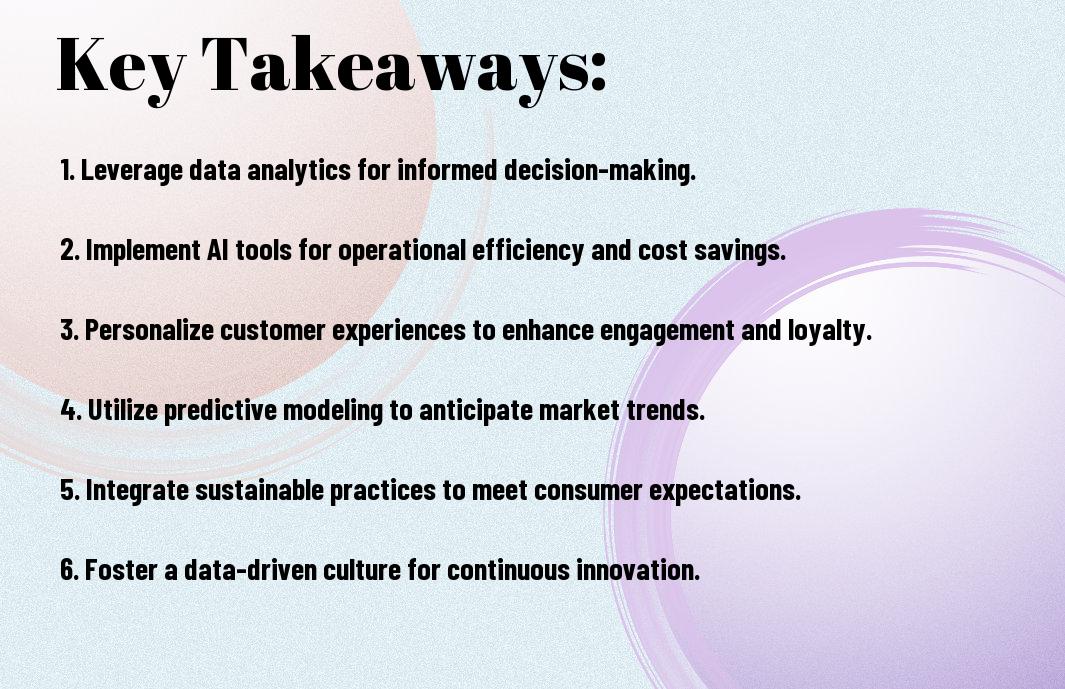You are likely aware that your business generates vast amounts of data daily. To turn this data into revenue, you need effective AI strategies. Your ability to leverage artificial intelligence can significantly impact your business’s sustainability and growth. By implementing the right AI techniques, you can unlock new opportunities, enhance decision-making, and drive profitability, ultimately transforming your data into dollars and securing your business’s future success.
Key Takeaways:
- Implementing AI strategies can lead to significant revenue growth and increased competitiveness for businesses, as it enables them to make data-driven decisions and automate processes, resulting in improved efficiency and reduced costs.
- Effective AI adoption requires a clear understanding of the organization’s goals and challenges, as well as a well-planned implementation roadmap that takes into account the company’s existing infrastructure, data quality, and talent availability.
- AI-driven business growth is not just about technology, but also about creating a culture that embraces innovation, experimentation, and continuous learning, allowing companies to stay ahead of the curve and achieve sustainable growth in a rapidly changing market landscape.
The Business Value of AI
To maximize your business potential, you need to understand the value of AI. You can learn more about How Strategic AI Operations Drive Business Growth and make informed decisions to drive your business forward.
Quantifying ROI from AI Implementations
Beneath the surface of AI adoption, you’ll find that measuring ROI is key. You can assess the financial impact of AI on your business by tracking metrics such as revenue growth and cost savings.
Balancing Investment and Returns
Across your organization, you need to strike a balance between AI investment and returns. You should weigh the costs of implementing AI against the potential benefits to ensure a positive impact on your bottom line.
Further, as you balance investment and returns, you’ll need to consider the long-term effects of AI on your business. You can achieve sustainable growth by continually assessing and adjusting your AI strategy to meet your evolving business needs, ensuring that your investments generate substantial returns and drive your business forward.

Data as the New Corporate Asset
Assuming you have a solid understanding of your business goals, you can begin to leverage data as a valuable asset to drive growth and profitability, enabling you to make informed decisions and stay ahead of the competition.
Building Data Infrastructure
Driven by the need for efficient data management, you will need to establish a robust infrastructure that supports your data-driven strategy, allowing you to collect, store, and analyze large amounts of data from various sources.
Data Quality and Governance
Qualified data is necessary for making accurate business decisions, and you must ensure that your data is accurate, complete, and consistent, with a clear governance framework in place to manage data access and security.
Another key aspect of data quality and governance is ensuring that your data is properly validated and verified, which will enable you to trust your data and make informed decisions, ultimately driving your business towards sustainable growth and increased profitability, as you continue to leverage your data as a valuable corporate asset.
AI-Driven Decision Making
Keep in mind that AI-driven decision making is the backbone of sustainable business growth, enabling you to make informed decisions and stay ahead of the competition. You can leverage AI to analyze vast amounts of data, identify patterns, and predict outcomes, ultimately driving your business forward.
Predictive Analytics for Market Trends
Besides traditional market analysis, you can use predictive analytics to forecast market trends and make data-driven decisions. You will be able to identify opportunities and potential pitfalls, allowing you to adjust your strategy and stay competitive.
Algorithmic Business Intelligence
Behind every successful business is a robust algorithmic business intelligence system, enabling you to process and analyze large datasets. You can use this information to optimize your operations, improve efficiency, and drive growth.
Decision makers like you can benefit from algorithmic business intelligence by gaining a deeper understanding of your customers, markets, and operations. You can use this insight to develop targeted strategies, optimize your supply chain, and improve your overall business performance, ultimately driving sustainable growth and increasing your bottom line.
Sustainable AI Implementation
Your business can benefit from sustainable AI implementation by reducing costs and increasing efficiency. You can achieve this by adopting AI solutions that align with your business goals and values. This approach will help you make informed decisions and drive growth.
Energy-Efficient AI Solutions
On the path to sustainable AI implementation, you’ll find that energy-efficient solutions are key. You can opt for cloud-based services or edge computing to reduce your carbon footprint. This will not only help the environment but also lower your operational costs.
Ethical Considerations in AI Deployment
Behind every successful AI implementation is a thorough consideration of ethical implications. You must ensure that your AI systems are fair, transparent, and respectful of user data. This involves being mindful of potential biases and taking steps to mitigate them.
EnergyEfficient AI solutions are not just good for the environment, but they also contribute to your business’s long-term success. As you consider ethical implications, you’ll need to think about how your AI systems will impact your customers, employees, and the wider community. You should prioritize transparency, accountability, and fairness in your AI decision-making processes to build trust and maintain a positive reputation.

Scaling AI Across Organizations
Not every organization can effectively scale AI across their operations, but you can by implementing the right strategies. You need to assess your current infrastructure and identify areas where AI can bring the most value to your business.
Department-Level Integration Strategies
Scaling your AI efforts starts with integrating AI into individual departments, allowing you to streamline processes and improve efficiency, and you can begin by identifying areas where AI can have the most impact in your organization.
Enterprise-Wide AI Architecture
At the heart of any successful AI implementation is a well-designed enterprise-wide AI architecture, and you should consider developing a centralized platform that can support your AI initiatives across all departments.
With a robust enterprise-wide AI architecture in place, you can ensure seamless data flow and integration across your organization, enabling you to make data-driven decisions and drive sustainable business growth, and you can leverage your AI capabilities to stay ahead of the competition and achieve your business goals.
Competitive Advantage Through AI
Once again, you have the opportunity to leverage AI to stay ahead of the competition, driving business growth and increasing revenue. By implementing AI strategies, you can analyze data, identify trends, and make informed decisions to outperform your competitors.
First-Mover Benefits in AI Adoption
Above all, adopting AI early on allows you to capitalize on its benefits, establishing your business as a pioneer in your industry. You can exploit new markets, improve customer experiences, and create innovative products, giving you a significant edge over late adopters.
Maintaining Technological Edge
Besides the initial benefits, you must continually update your AI systems to maintain a competitive advantage. You should invest in ongoing research and development, ensuring your business stays at the forefront of AI innovation, and adapts to changing market conditions.
Technological advancements in AI are happening rapidly, and you need to stay informed about the latest developments to maintain your edge. You should focus on developing a culture of innovation within your organization, encouraging experimentation and learning, and leveraging AI to drive continuous improvement and optimization of your business processes.
Final Words
Following this guide, you now have a comprehensive understanding of how to leverage AI for sustainable business growth, transforming your data into dollars. You can apply these strategies to enhance your decision-making, optimize operations, and drive innovation. By implementing AI solutions, you will unlock new opportunities, boost your revenue, and stay ahead of the competition, ultimately ensuring your business’s long-term success and increasing your bottom line.
FAQ
Q: What is the main focus of the book “From Data to Dollars – AI Strategies for Sustainable Business Growth”?
A: The book “From Data to Dollars – AI Strategies for Sustainable Business Growth” focuses on providing businesses with practical strategies for leveraging artificial intelligence (AI) and data analytics to drive sustainable growth and increase revenue. It explores how companies can harness the power of AI to make data-driven decisions, improve operational efficiency, and innovate their business models.
Q: How can businesses use AI to drive sustainable growth and what are the benefits of doing so?
A: Businesses can use AI to drive sustainable growth by implementing strategies such as predictive analytics, machine learning, and natural language processing. The benefits of using AI for sustainable growth include improved forecasting and decision-making, enhanced customer experiences, increased operational efficiency, and reduced costs. Additionally, AI can help businesses identify new revenue streams and opportunities for innovation, leading to long-term sustainability and competitiveness.
Q: What role does data play in AI strategies for sustainable business growth, and how can businesses ensure they are collecting and using data effectively?
A: Data plays a central role in AI strategies for sustainable business growth, as it provides the foundation for training AI models and making data-driven decisions. To ensure they are collecting and using data effectively, businesses should focus on collecting high-quality, relevant data from a variety of sources, and invest in data management and analytics capabilities. This includes implementing data governance policies, using data visualization tools, and ensuring that data is accessible and usable across the organization.
Q: How can small to medium-sized businesses (SMBs) implement AI strategies for sustainable growth, given limited resources and budget constraints?
A: SMBs can implement AI strategies for sustainable growth by starting small and focusing on specific business challenges or opportunities. This can include using cloud-based AI services, partnering with AI vendors or consultants, and leveraging open-source AI tools and platforms. Additionally, SMBs can prioritize areas such as customer service, marketing, and operational efficiency, where AI can have a significant impact. By taking a phased and focused approach, SMBs can achieve significant benefits from AI without breaking the bank.
Q: What are some common challenges or obstacles that businesses may face when implementing AI strategies for sustainable growth, and how can they overcome them?
A: Common challenges or obstacles that businesses may face when implementing AI strategies for sustainable growth include data quality issues, lack of AI expertise, and cultural or organizational resistance to change. To overcome these challenges, businesses should prioritize AI education and training, invest in change management and communication efforts, and focus on building a strong data foundation. Additionally, businesses should be patient and persistent, as implementing AI strategies for sustainable growth is a long-term effort that requires ongoing commitment and investment.



